Reading Recs and the New Epics
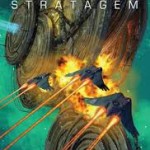 A long-overdue bit of bloggery for one reason or another, but time to run down on some more good stuff I've read, starting with Sequels Corner. Recommending sequels is always a bit of an oddity. Did you like [Book 1]? In which case you'll probably like this one approximately more or less as much. However, there have been a couple definitely strong enough to warrant a word. Firstly, Yoon Ha Lee's Raven Stratagem is a cracking follow-up to the world-class Ninefox Gambit. There's a great deal to love here, not only a widening of Lee's fascinating universe but also a particularly cunning game the author plays with their readership (which I can't really go into because of spoilers). There's also the simple fact that this book ends the midpoint of a series where most series would just cut to credits, making me wonder what new reaches the next novel is going to explore.
A long-overdue bit of bloggery for one reason or another, but time to run down on some more good stuff I've read, starting with Sequels Corner. Recommending sequels is always a bit of an oddity. Did you like [Book 1]? In which case you'll probably like this one approximately more or less as much. However, there have been a couple definitely strong enough to warrant a word. Firstly, Yoon Ha Lee's Raven Stratagem is a cracking follow-up to the world-class Ninefox Gambit. There's a great deal to love here, not only a widening of Lee's fascinating universe but also a particularly cunning game the author plays with their readership (which I can't really go into because of spoilers). There's also the simple fact that this book ends the midpoint of a series where most series would just cut to credits, making me wonder what new reaches the next novel is going to explore. 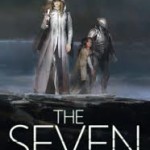 This is, as it happens, also true of the other series I have on my list here, as I finished off Peter Newman's The Seven, book three of the excellent series that began with the acclaimed The Vagrant. Book 2, The Malice, could well have been a very satisfactory end to a more traditional good versus evil narrative, but Newman has a lot more to say about consequences in the third book, as well as finishing off the strange story of how this world came to be. Now complete (for those who don't touch these things until they are), the whole is one of the most innovative and interesting fantasy series of recent years.
This is, as it happens, also true of the other series I have on my list here, as I finished off Peter Newman's The Seven, book three of the excellent series that began with the acclaimed The Vagrant. Book 2, The Malice, could well have been a very satisfactory end to a more traditional good versus evil narrative, but Newman has a lot more to say about consequences in the third book, as well as finishing off the strange story of how this world came to be. Now complete (for those who don't touch these things until they are), the whole is one of the most innovative and interesting fantasy series of recent years.
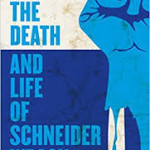 I'm going towards a larger topic, but I have a couple of other mentions to get through, first of all Nate Crowley's The Death and Life of Schneider Wrack, collecting the linked novellas The Sea Hates a Coward and Grand Amazon. This also stands as a masterpiece of the weird: Schneider Wrack wakes up dead, a zombie toiling on an extraterrestrial whaling ship. He was once a mild-mannered librarian, or alternatively a dangerous political dissident — his memories so scattered he doesn't even know what he did to deserve the fate. The world of the whaler Tavuto, the endless ocean where it plies its trade, the exploitation of the dead and the even more bizarre places (geographically and personally) Wrack's journey takes him are a whirl of grotesque, often bleakly funny originality.
I'm going towards a larger topic, but I have a couple of other mentions to get through, first of all Nate Crowley's The Death and Life of Schneider Wrack, collecting the linked novellas The Sea Hates a Coward and Grand Amazon. This also stands as a masterpiece of the weird: Schneider Wrack wakes up dead, a zombie toiling on an extraterrestrial whaling ship. He was once a mild-mannered librarian, or alternatively a dangerous political dissident — his memories so scattered he doesn't even know what he did to deserve the fate. The world of the whaler Tavuto, the endless ocean where it plies its trade, the exploitation of the dead and the even more bizarre places (geographically and personally) Wrack's journey takes him are a whirl of grotesque, often bleakly funny originality.
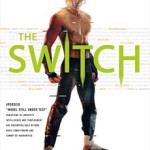 I also had the pleasure of reading Justina Robson's The Switch, which seems to have snuck into print without my being any the wiser, and, I'm going to be frank, is lumbered with a cover that doesn't do it many favours. Which is a shame, because this is a top notch book. I'm a big fan of Robson's at any time. Glorious Angels, her previous book, was mind-blowing post-fall SF with all manner of other elements woven into the mix. The Switch is a far future cyberpunk (term used advisedly) chase through a world ruled by a corrupt and crazy (and seriously homophobic) theocracy. The 'hero' is an elegant thug, a prize-fighter, who ends up with a very contraband piece of hardware in his head, linking him to something vastly grander and more destructive than he can encompass. Plus there's the possibility that the theocracy, with its claims of being able to breed the miraculous, might not be that crazy after all, interference by offworld agencies that don't give a damn about the Prime Directive, and a genuinely fulfilling character arc for the lead. Robson is always worth picking up, and never disappoints.
I also had the pleasure of reading Justina Robson's The Switch, which seems to have snuck into print without my being any the wiser, and, I'm going to be frank, is lumbered with a cover that doesn't do it many favours. Which is a shame, because this is a top notch book. I'm a big fan of Robson's at any time. Glorious Angels, her previous book, was mind-blowing post-fall SF with all manner of other elements woven into the mix. The Switch is a far future cyberpunk (term used advisedly) chase through a world ruled by a corrupt and crazy (and seriously homophobic) theocracy. The 'hero' is an elegant thug, a prize-fighter, who ends up with a very contraband piece of hardware in his head, linking him to something vastly grander and more destructive than he can encompass. Plus there's the possibility that the theocracy, with its claims of being able to breed the miraculous, might not be that crazy after all, interference by offworld agencies that don't give a damn about the Prime Directive, and a genuinely fulfilling character arc for the lead. Robson is always worth picking up, and never disappoints.
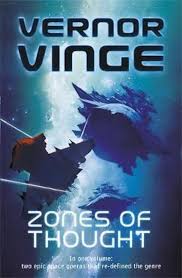 As a late addition to my list, I have finally read Vernor Vinge's Zones of Thought duo, collecting A Fire Upon the Deep and A Deepness in the Sky, because these (the latter especially) are the books everyone compared Children of Time to from the moment it was released. And yes, Deepness does have an emergent civilisation of spider-like aliens, so perhaps the comparison was inevitably quick to come. However, giving critics their due (and not wanting to overpraise my own work) I feel a definite kinship inthe way Vinge approaches writing the alien. In Fire there is a wonderful society of dog-like creatures where packs are mentally linked, so that a group of four or five is an individual. There is a wider plot involving humans crashing on the planet and some truly interstellar scale stuff going on, but it is the Trines and their world I loved most. Vinge thinks through the consequences of his set-up through to all sorts of strangeness, all beautifully logical in its presentation. In Deepness, we have a civilisation of spiders living on a planet where the sun just… goes out for 200 years of every 300. They have evolved, genetically and socially, to work to this rhythm of activity and hibernation, but now they're hitting around a 20th century level of tech, and some of them are suggesting that they don't have to be slaves to the sun. At the same time, their progress is watched by a particularly conflicted and toxic human colony orbiting their planet, just waiting for them to become advanced enough to be useful… And another thing Vinge does so very well is presenting novel forms of evil. The Emergents from Deepness and Flenser/Steel from Fire are utterly, horrifyingly loathsome, whilst also being entirely logical consequences of their culture and history. In short: if you did like Children of Time then these books are for you. They are pure SF gold.
As a late addition to my list, I have finally read Vernor Vinge's Zones of Thought duo, collecting A Fire Upon the Deep and A Deepness in the Sky, because these (the latter especially) are the books everyone compared Children of Time to from the moment it was released. And yes, Deepness does have an emergent civilisation of spider-like aliens, so perhaps the comparison was inevitably quick to come. However, giving critics their due (and not wanting to overpraise my own work) I feel a definite kinship inthe way Vinge approaches writing the alien. In Fire there is a wonderful society of dog-like creatures where packs are mentally linked, so that a group of four or five is an individual. There is a wider plot involving humans crashing on the planet and some truly interstellar scale stuff going on, but it is the Trines and their world I loved most. Vinge thinks through the consequences of his set-up through to all sorts of strangeness, all beautifully logical in its presentation. In Deepness, we have a civilisation of spiders living on a planet where the sun just… goes out for 200 years of every 300. They have evolved, genetically and socially, to work to this rhythm of activity and hibernation, but now they're hitting around a 20th century level of tech, and some of them are suggesting that they don't have to be slaves to the sun. At the same time, their progress is watched by a particularly conflicted and toxic human colony orbiting their planet, just waiting for them to become advanced enough to be useful… And another thing Vinge does so very well is presenting novel forms of evil. The Emergents from Deepness and Flenser/Steel from Fire are utterly, horrifyingly loathsome, whilst also being entirely logical consequences of their culture and history. In short: if you did like Children of Time then these books are for you. They are pure SF gold.
Now, last time at the helm I had read Age of Assassins, Kings of the Wyld and Court of Broken Knives, and you can see my thoughts on those here. These three form part of a set of fantasy novels that all seem to have come out within a few months of each other (or at least which I became aware of around the same time), and so in my mind form a next generation of sorts within the UK fantasy genre. Things seldom line up quite like this, but there was definitely a group of writers I felt I came up through the ranks with, and there have been a few others in the interim.
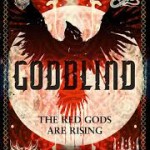 The two I hadn't got round to at that point were Blackwing by Ed McDonald and Godblind by Anna Stephens. Last to First, Godblind is very much what I'd think of as an epic fantasy in the traditional vein — the sort of book that John Gwynne writes so well, for example. There is politics and there is war, and a big cast of characters giving input on all sides. In Godblind the bad guys are bad (they're the followers of the goddess of pain so there's very little moral wiggle room for them to be honest) and the good guys are generally good. It's a story of a grand scale, and very much Part One of a long series. The world is interesting — the magic walks a fine balance where it is definitely present and powerful, but at the same time accessible only to a few or under extreme circumstances. The gods of the title are definitely more than just carven idols and empty worship, though, and benevolent and malign deities are actively weighing on the scales — not something you see in fantasy as much as you'd think. I did have some problems with the book as a reader, primarily that there are a lot of POV characters and individual sections are extremely short, sometimes just 3 pages or so, which rather than pace can give an impression of wheels spinning while the plot goes nowhere. (Empire in Black and Gold in its original form had exactly the same issue, but sections got stitched together in edits.)
The two I hadn't got round to at that point were Blackwing by Ed McDonald and Godblind by Anna Stephens. Last to First, Godblind is very much what I'd think of as an epic fantasy in the traditional vein — the sort of book that John Gwynne writes so well, for example. There is politics and there is war, and a big cast of characters giving input on all sides. In Godblind the bad guys are bad (they're the followers of the goddess of pain so there's very little moral wiggle room for them to be honest) and the good guys are generally good. It's a story of a grand scale, and very much Part One of a long series. The world is interesting — the magic walks a fine balance where it is definitely present and powerful, but at the same time accessible only to a few or under extreme circumstances. The gods of the title are definitely more than just carven idols and empty worship, though, and benevolent and malign deities are actively weighing on the scales — not something you see in fantasy as much as you'd think. I did have some problems with the book as a reader, primarily that there are a lot of POV characters and individual sections are extremely short, sometimes just 3 pages or so, which rather than pace can give an impression of wheels spinning while the plot goes nowhere. (Empire in Black and Gold in its original form had exactly the same issue, but sections got stitched together in edits.)
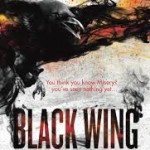 Blackwing is a very interesting prospect. Is it Grimdark? I was on a panel with Ed at Fantasycon where he coined the term "Grimheart" as a joke, but there's a genuine point there. It is a very grim world, overshadowed by a magical war of unthinkable powers who use humans (or enslaved former humans) as their pawns. The last major kick-off led to a large portion of the world becoming a chaotic nightmare of monsters, broken land and poisonous weather, and things have only gone downhill from there. At the same time the main character Galharrow is not your pitiless Bad-Man-In-A-Bad-World, but instead is basically Rick from Casablanca, the world-weary bitter man who can still be called back to do the right thing. McDonald has a compelling style, and he gives Galharrow a strong, likeable voice. More, the world has that fine balance where it gives a fantasy reader what they want whilst also reserving a fair amount of the new. I was definitely put in mind of Newman's The Vagrant which pulled off the same trick so well.
Blackwing is a very interesting prospect. Is it Grimdark? I was on a panel with Ed at Fantasycon where he coined the term "Grimheart" as a joke, but there's a genuine point there. It is a very grim world, overshadowed by a magical war of unthinkable powers who use humans (or enslaved former humans) as their pawns. The last major kick-off led to a large portion of the world becoming a chaotic nightmare of monsters, broken land and poisonous weather, and things have only gone downhill from there. At the same time the main character Galharrow is not your pitiless Bad-Man-In-A-Bad-World, but instead is basically Rick from Casablanca, the world-weary bitter man who can still be called back to do the right thing. McDonald has a compelling style, and he gives Galharrow a strong, likeable voice. More, the world has that fine balance where it gives a fantasy reader what they want whilst also reserving a fair amount of the new. I was definitely put in mind of Newman's The Vagrant which pulled off the same trick so well.
So: looking at those five books, Assassins, Broken Knives, Blackwing, Wyld and Godblind, what was the thinking 18m to 2 years ago amongst commissioning editors? Mostly, no idea. There's an interesting spread that suggests fantasy is going back towards the more magical — Age of Assassins is arguably the least magic and its hero is an actual magician. I also get a sense that these books are building on strong past foundations. Drawing inferences as to individual writers' inspirations is always a dodgy game, but I've picked up a definite sense of Hobb, Gemmell and Polansky in the mix. At the same time there is a lot of the new here, whether it's Broken Knives' ambitious, elegant prose, the sly social commentary of Assassins' 'Blessed' and 'Grateful' for its nobles and commoners, or the fact that most of these books create diverse worlds treating openly on topics that epic fantasy has traditionally been slow about — openly homosexual characters, for example. Plus there's a nice scatter between the more-grimdark of Knives and Blackwing through the "serious epic" of Godblind and on to the more personal story of Assassins and the semi-comedy of Kings of the Wyld that makes all five very pleasant a read together, as they don't step on each other's toes much at all. I suspect there will be a fiercer than usual fight over the Morningstar Award in the Gemmells next year.
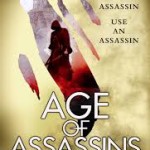
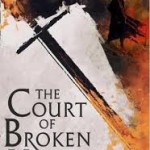
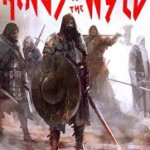
 © 2008-2025 Pan Macmillan
© 2008-2025 Pan Macmillan